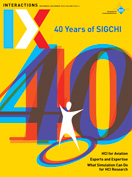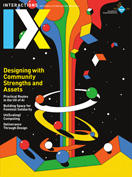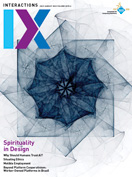Authors:
SIGCHI Executive Committee
Nurturing strengths and capacities across SIGCHI requires a robust, committed culture around mentoring. Many of us have been fortunate to cultivate strong ties with those we call mentors, whether older or younger than us, across diverse career stages, with similar or different institutional affiliations, toward short- and long-term goals, for life and work. But the need for more—and more effective—mentorship opportunities across SIGCHI is frequently voiced. The SIGCHI open sessions on mentorship organized by members of the Executive Committee (EC) earlier this year aimed to understand this need better, posing questions such as: 1) What do good mentors and good mentorship look and feel like?, 2) What are examples of good mentorship programs?, and 3) What are SIGCHI's mentorship needs and aspirations? The EC's goal was to understand the nature and extent of the infrastructuring needed to create sustainable practices in support of nurturing different types of knowledge and experience across SIGCHI.
Participants shared that good mentors and mentorship were typically associated with the adjectives enthusiastic, respectful, comfortable, nonjudgmental, supportive, and adaptive. Good mentorship signaled clarity around mutual expectations, supported career advancement, and placed care before productivity, focusing throughout on the needs and aspirations of the mentee. It generally depended on shared traits (e.g., a shared cultural, epistemological, and/or experiential identity) but also added something new. Good mentors made mentees feel "heard, safe, and supported."
Good mentoring requires closeness and comfort but also careful and consistent attention to setting boundaries, to manage demands on time and energy.
Participants asserted, though, that good mentorship does not have to look a certain way; that is, mentors do not have to be older and/or more senior, even if they often are. Reverse mentor/ mentee roles could offer much-needed knowledge and support. Mentoring relationships are often one-on-one but can be one-on-many; they can be short-lived or last several years. Good mentoring requires closeness and comfort but also careful and consistent attention to setting boundaries, to manage demands on time and energy. Finding mentors is hard. Even when a mentor is available, it can be difficult to solicit time and advice. For mentors, too, time, effort, and mindspace are necessary to understand the specific needs and circumstances of a mentee, while avoiding projecting based on one's own experiences. Understanding the labor and gains on both ends becomes crucial then for a mutually meaningful mentoring experience.
Like any other community invested in the professional success of its members, the SIGCHI community has been committed to making space for mentoring. For example, for DIS 2022, Michael Muller and Katta Spiel ran a mentorship program for associate chairs on the program committee. With 70 participants across tracks, the COMPASS 2021 Shadow Program Committee served as yet another example of a training ground for future associate chairs. Doctoral consortia offer a unique channel for mentoring our early-career scholars, introducing them to experts and advice they might otherwise have limited access to. SIGCHI chapters in many parts of the world have organized mentoring sessions on producing scholarship for varied HCI venues. The Trans/Queer in HCI 1-1 Mentoring Program (https://queerinhci.wordpress.com/) was initiated in 2021 to connect LGBTQIA+ individuals in HCI with professional and personal mentors.
Listening to and assessing mentorship needs across contexts, providing coordination for setting up mentoring channels in the long and short term, supporting others who would like to invest in mentoring efforts—these are all undertakings that the EC is engaged in. We are keen for top-down and bottom-up efforts to thrive, to establish a culture around mentoring, and to center care that goes beyond transactional exchanges—not only in principle but also in the day-to-day. In the next two years, we hope to organize and package resources to support writing papers for SIGCHI venues, create channels for supporting knowledge sharing for conference chairing, organize events that center mentorship of leadership across venues, set up a sandbox to support early careers in reimagining SIGCHI futures, create virtual touchpoints for the community with SIGCHI awardees, and engage with regional HCI communities via summer and/or winter schools, among other activities.
But there are some tendencies to protect against. It is important we remember, for one, that the goal of mentoring is not to be "fair," because mentoring needs vary widely. It is crucial to invest time and effort in understanding what "just" mentorship might look like. Identity-based biases can creep in and we must check for them. Ultimately, through mentorship, our goal is not to take on a deficits-focused approach by focusing on "lack" but rather, as the articles in this issue remind us, to adopt an assets-based view that honors strengths and values that are perhaps different from our own, which could provide openings for co-mentoring as well. It is also worth asking whether our inclination toward "fixing" people might instead be directed toward addressing structural inequities and engendering greater advocacy. Incentivizing mentorship is no trivial task, but creating awards and other forms of recognition that make mentoring labor visible and signal how deeply we gain from and value it could be helpful. Better organizing and managing resources and guidelines across our conferences can ease the burden on our volunteers, while providing much-needed scaffolding and direction. We also need support and enrollment from you, the SIGCHI community, for these efforts to be successful. And, of course, your input, ideas, and suggestions will always be welcome at [email protected].
Copyright held by authors
The Digital Library is published by the Association for Computing Machinery. Copyright © 2022 ACM, Inc.







Post Comment
No Comments Found